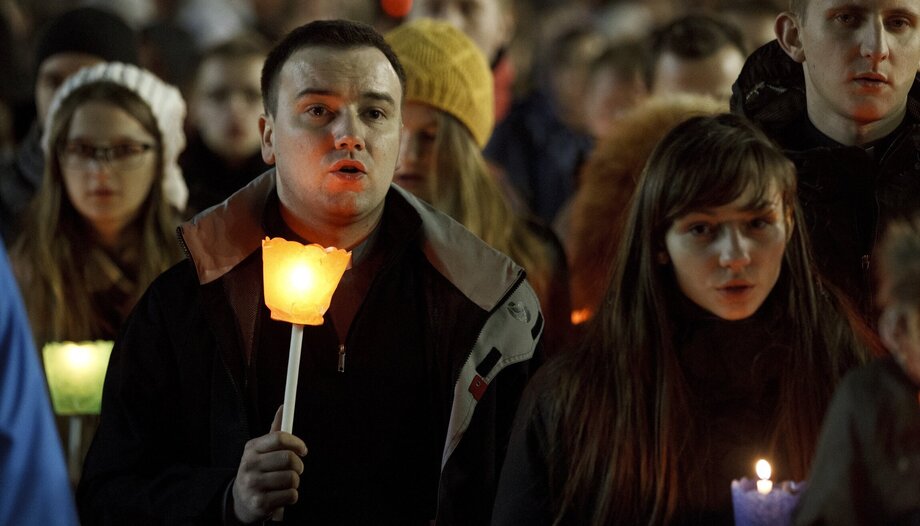Each year, the Church participates in the World Week of Prayer for Christian Unity.
Are we approaching the great goal, or are the differences too great and the fissures too deep? And the difficulties in which the Church itself finds itself: with a massive decline in the practice of the faith, especially in highly developed countries, despite a millennia-old Christian tradition, with endless controversies, criticism from all sides, which is also a problem for Pope Francis.
Will the Church succeed in overcoming the loss of confidence suffered as a result of the abuse incidents and, despite the disputes between liberal and conservative forces that have existed since the Council, be faithful to the Gospel message, proclaim it with courage, but also transmit paths of healing and forgiveness when needs arise as a result of failures and difficulties of all kinds, as the Pope especially emphasizes? Or will the adversary succeed in silencing the Church's voice on essential issues and blinding the paths of healing and forgiveness?
It is good that we are drawn to the World Week of Prayer for Christian Unity and perceive the urgency of praying for all Christians, most especially for Pope Francis and his collaborators, indeed, for the whole Church and all Christians.
At times-precisely in recent years-I have asked myself what St. Josemaría, whose birthday we have just celebrated, would say to us in the Church's present situation. I always come to the same conclusion. Undoubtedly he would cry out to us: "Don't be afraid. We would hear the same from all the Popes of recent decades, from St. John XXIII to Pope Francis. Yes, Jesus himself gives us this answer when we turn to him in prayer.
He overcame the world, bore witness to the truth, gave his life for it, and by his suffering and death on the cross, by his obedience unto death, and death on a cross, overcame sin and overcame death. He has risen and returned to the Father's house as "the firstborn from the dead" (Col 1:18). Nevertheless, he continues to be present in the Church, because the Holy Spirit is sent into the world by the Father and by him, his Son, until the end of time, so that he may bring forth in the Church the work of redemption accomplished by Jesus and by himself, making it accessible to all and, in some way, also visible, despite the weakness of those who carry it, indeed, precisely through it. This is how Christianity can endure, in all situations and problems, in all times, even today.
Since the beginning of the Church, there have always been counterpositions. Sometimes they were very fierce and even led to splits. In difficult questions, the processes of clarification have often taken a long time. And papal decisions have sometimes, in other ages, met with incomprehension and resistance. But the Holy Spirit not only saved the Church from destruction, but also renewed it as soon as the time was ripe.
The unity of the Church arises-in a certain sense, always anew-from Christ: "Abide in me and I in you" (Jn 15:4), he promised; and he made the promise: "If you abide in me and my words abide in you, ask whatever you wish, and it will be done for you" (Jn 15:7). We have good reason to have confidence.
Man can certainly accomplish many things and achieve great success without God, but it is often difficult in the long run. Without God, there is no inner center, so why all the effort, all the striving? It is not uncommon for a kind of war to break out in our own lives and in our environment, because everyone is only looking out for himself. Pope Benedict XVI has sometimes expressed it most aptly, saying that without God, life becomes hell. Faith in Jesus opens the perspective of salvation: Jesus leads us to the Father, who forgives us and teaches us to forgive. Jesus gives us the bread that comes from heaven. He gives Himself and teaches us to love as He loves. However, the "feel-good" and "feel-good" society also teaches us that a routine Christianity, without personal effort, or a "selective Christianity", which takes from the faith what suits one's own lifestyle, without the need for a change, does not redeem, and often leads to the loss of faith in the next generation at the latest, if there is no new and personal encounter with Christ. In this sense, all lukewarm Christianity is in danger.
The following motto has been chosen for the World Week of Prayer 2024: "Love the Lord your God and your neighbor as yourself". It helps us to look to the future with a certain serenity; with the desire to carry Jesus in our hearts, well disposed to raise our voice when it is useful; but also ready to listen, as Pope Francis desires, and always with the firm intention of avoiding negative criticism, which does not prevent us from imploring the Holy Spirit to bring about the necessary clarifications as soon as the moment is ripe; indeed, may he cause it to take place as soon as possible.
Bishop emeritus of Sankt Pölten, Austria.








